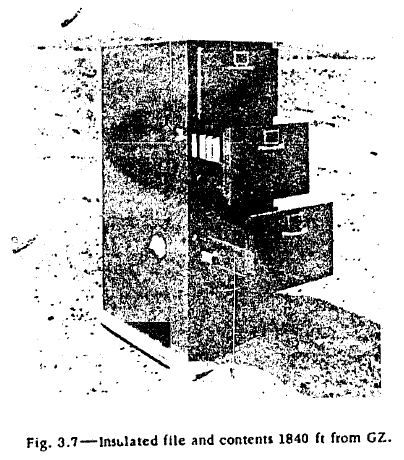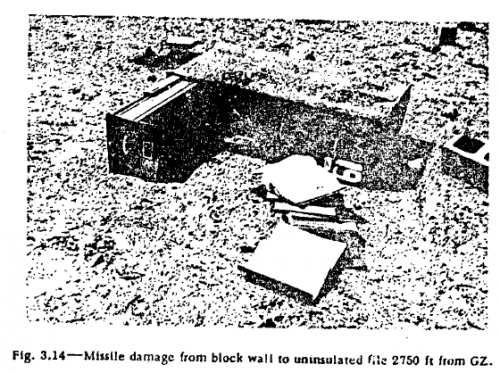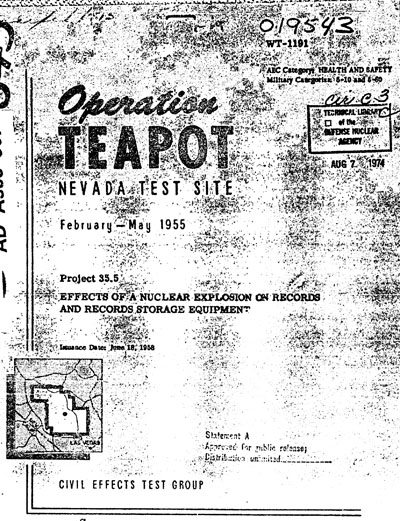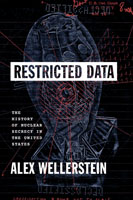This week’s document concerns a vexing Cold War question: if the United States was nuked by the Soviet Union, would the bureaucracy survive, or would we have to start from scratch? Would nuclear apocalypse accomplish the ultimate deregulation, the ultimate experiment in small government? Would all debts be off, all credit clean, all records blanked? For God’s sake, what would happen to private business, private industry? If capitalism was destroyed in a nuclear inferno, would the survivors envy the dead?
Faced with this crushing uncertainty, the U.S. government approached the problem methodically. In the spring of 1955, they nuked the heck out of some filing cabinets.

One unlucky filing cabinet. (GZ = “Ground Zero”)
During Operation Teapot, a weapons effects test series at the Nevada Test Site, one of the many tests performed was “Project 35.5.” “The objectives of Project 35.5,” the final report explains, “were to determine the effects of a nuclear explosion on various types of records and record storage equipment.” Lots of different filing cabinets, document boxes, and safes were placed in various configurations (some in houses, some just out by their lonesome) within the range of the 29-kiloton nuclear test “Apple II.” 1 (No relation to this “Apple II.”)
The preface of the report explains that this was proposed by the Federal Civil Defense Administration to the National Records Management Council as a means of assessing the “widespread damage to business records and storage facilities” that would be caused by nuclear explosions. The language used is great:
Business records are the memory of an organization. Preservation of important business records in a disaster can help ensure survival of managerial direction and continuity of enterprise. If essential records are available after a catastrophe, management has the information required to resume operations with minimum delay.
I’m sure that’s what everyone’s prime concern was going to have been in the event of a nuclear exchange. Forget the megadeaths — when will Mastercard be up and running again?
You can read the 43-page report with the link above if you are curious about the technical details. The records do surprisingly well. A filing cabinet or safe in a basement or reinforced office building does pretty well fairly close to Ground Zero. Things get thrown around a bit by the shock wave, but paper doesn’t mind that too much.
The people in those same spaces, probably not so much.
How survival of “managerial direction and continuity of enterprise” was supposed to take place when all of your managers and employees and customers were dead, I’m not sure. The bureaucracy might survive, but I think I will go out on a limb here and suggest that nuclear war is bad for business. 2

- Citation: “Operation Teapot, Project 35.5 (February-May 1955): Effects of a Nuclear Explosion on Records and Records Storage Equipment (WT-1191),” (18 June 1958), copy in the Nuclear Testing Archive, Las Vegas, NV, document NV0051120.[↩]
- For more fun Civil Defense stuff, check out Susan Roy’s recent book, Bomboozled.[↩]



[…] Wednesday’s post, I made the bold assertion that nuclear warfare would probably be bad for business. Today’s image […]
[…] Defense is easy to mock, and I’ve done a little mocking of it on here myself. I don’t have strong feelings on the topic. I don’t really buy the argument that it was […]
[…] lines I’ve already discussed in the past: What do you do with all of the dead people? and What will happen to all of our paper-based records? Both of which have “interesting” […]